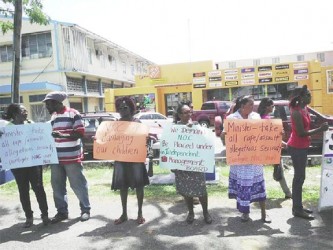Opposition Leader David Granger yesterday warned government to expect a “juk fuh juk” retaliation from the United States in the wake of the revocation of the work permit of Leadership and Demo-cracy (LEAD) Project Head, Glen Bradbury.
His views were similar to former ambassadors who spoke with Stabroek News and who say that the US’ course of action could range from mild to very harsh.
“My own feeling is that the government will have to pay a price for terminating the work permit of Bradbury… In diplomacy is juk fuh juk,” Granger said.

On Wednesday last, government announced that the work permit for Bradbury had been revoked for activities that offended the Laws of Guyana. The move sparked surprise here and concerns about how this would impact on relations with Washington.
The permit revocation would be seen as an escalation of the row with the US over the project. It comes after the US had stated that it was going to ahead with the project with other stakeholders notwithstanding the government’s objections. The project was inaugurated in July, 2013 but matters came to a head late last year when the government announced that it was abandoning it because of a lack of consultation, a charge that Washington strongly rejected.
While up to yesterday the embassy would not say if the project would go ahead, it had been adamant that the programme would proceed as planned despite objections as there were specified contract timelines for the monies already allocated.
Granger stated that he regretted government’s move, saying that he believed that it was an act of vindictiveness brought on by the PPP/C administration’s long embedded fear of the West. “This government has a mindset which was moulded during the 1960s… when the PPP/C criticised the US for interfering in the politics of Guyana… what I see happening with Mr. Bradbury is evidence of that same mindset,” he stated.
He pointed out the importance of the project, explaining the many benefits to the populace especially Guyanese youths.
“We feel that the LEAD Programme was working to the benefit of young people in Guyana because it started to provide information, particularly on the upcoming Local Government Elections,” he noted
“We did not have any other involvement in LEAD other than education and we felt that the limited engagements we had were beneficial to young people and the withdrawal of the programme will hurt the ability of the young people to comprehend a very complex electoral system and to participate fully,” he added.
Stabroek News spoke with former Minister of Foreign Trade in the PPP/C government, Dr Henry Jeffrey and past ambassadors and political analysts who expressed varying views on the topic.
“I don’t see any great overt action…I don’t think they would use any sanctions or stop giving visas or anything of that sort and I don’t think they will revoke anybody’s visas,” Jeffrey opined.
He said that from his analysis, putting restrictions on the issuances of visas here will affect the people of Guyana and it is the very masses that the LEAD project targets to educate about democracy.
However, he believes that given the influence and reach of the United States, Guyana should expect some repercussions. “They (the United States) can use them (International organizations and countries) to stymie projects and in asking for aid Guyana could very well see none coming their way,” he said.
A former ambassador who wished to remain anonymous told Stabroek News that he does not believe that the Barack Obama administration will adopt a “tit for tat” attitude but will instead seek to engage government in dialogue to find an amicable soloution.
“This Barack Obama administration is trying to keep an image and is conscious of the fact that they do not want the United States made to seem like big bullies of little countries. The US is quite restrained these days… they will press for talks,” the former ambassador said.
“They will confine it to one area and not allow this issue to spread to the overall architecture of diplomatic relations here… the Americans though have put up with a lot, they will go the path of least resistance.”





